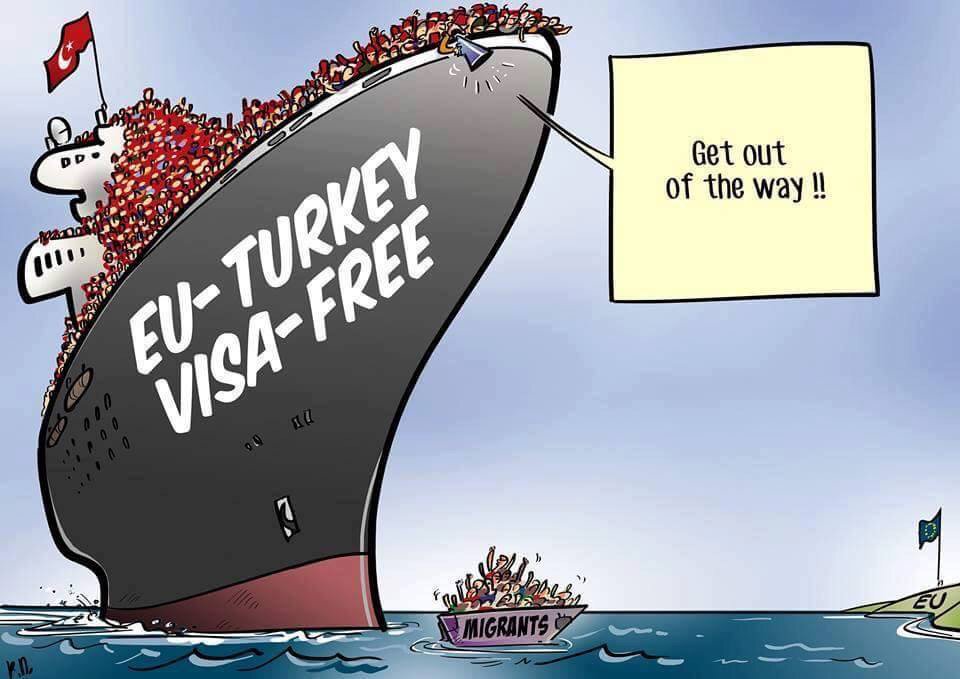
Postuar në 08 Maj, 2016
Panajot Barka
Para do kohësh drejtuesi i opozitës sllavomaqedonase akuzoi nominalisht, politikanë të rendësishëm shqiptarë në ish - Republikën Jugosllave të Maqenonisë për bashkëpunim me struktura shtetërore sekrete dhe publike të shtetit fqinj për interesa personale, politike dhe ekonomike.
Kjo akuzë nxiti analizën për një kapje të ngjashme ndër vite të përfaqësuesve politikë të minoritetit etnik grek në Shqipëri, por në dëm të interesave të këtij minoriteti. Për vërtetimin e kapjes së përfaqësuesve të minoritetit nuk do të sjellim të njëjtat mjete (përgjime), por një qasje tjetër. Do të ballafaqojmë nga njëra anë realitetin diskriminues shumëplanësh të minoritetit etnik grek, zhbërjen e tij demografike dhe ekonomike, edhe në zonat me popullsi kompakte, fragmentarizimin dhe përjashtimin i këtij minoriteti nga vemendja politike, ekonomike e shtetit dhe e organizmave ndërkombëtare. Nga ana tjetër qëndron, mbijetesa politike e përfaqësuesve politikë të minoritetit etnik grek, jo me votat e tij, por si “dëshirë” e strukturave politike shqiptare, shtimi pa fre i pasurisë së tyre dhe sfumimi në progresion gjeometrik i përpjekjeve të tyre për mbrojtjen e të drejtave të minoritetit. Ky realitet përbën treguesin më kokëfortë të kapjes së tyre.
Shembujt në vijim nuk janë thjeshtë vërtetues të kësaj kapjeje, i përmasave dhe kohëzgjatjes së saj, por edhe të arsyeve dhe synimeve pse ajo ndodh.
Një grup të rinjsh nga minoriteti, zotërojnë dokumente që vërtetojnë se vetëm në zonat me popullsi kompakte minoritare në rrethet Sarandë e Delvinë janë tjetërsuar me dokumente të falsifikuara, me vendime gjyqësore të manipuluara dhe në shkelje të ligjit, apo me vendime të ngjashme të strukturave të tjera të shtetit, 220 mijë dynimë tokë në përkatësi të këtij komuniteti. Me këtë mekanizëm këto sipërfaqe iu kthyen gjasme ish- pronarëve pa asnjë lloj lidhjeje me minoritetin grek. (Për 120 mijë dynym posedohen dosjet konkrete të shkeljeve dhe abuzimeve ligjore dhe për 100 mijë të tjera procesi është në vijim). Në aspektin social, politik e historik fenomeni duhet konsideruar si neootomanizim i këtyre krahinave minoritare greke. Kjo pasi dokumentat, të falsifikuara ose jo, ku mbështetet tjetërsimi i pronësisë, e kanë origjinën në Perandorinë Otomane. Bëhet fjalë për pretendime që zënë fill të paktën që pas shekullit të 16të, atëherë kur pushteti islamik i Perandorisë u rrëmbente me dhunë tokën të krishterëve që nuk pranonin të ndërronin fenë, për të shpërblyer ata që myslimanizoheshin dhe viheshin në shërbim të perandorisë. Neootomanizimi po ndodh pa zhurmë dhe me një tolerim civil dhe institucional në të gjithë Shqipërinë, por në rastin e minoritetit grek fenomeni lidhet esencialisht me ruajtjen e identitetit etnik të tij. Aq më keq kur faktet vërtetojnë se nuk kemi të bëjmë me “trashëgimtarë” të drejtpërdrejtë të ardhur nga shekujt (gjë që s’mund të ndodhë), por me individë që zotërojnë sot pushtet politik, ose kanë suport politik për të abuzuar dhe shkelur ligjin.
Nga ana tjetër evidentohet fakti drithërues se këtë proces tjetërsues pronash të minoritetit e toleroi dhe e favorizoi që më 1998-99 kryetari i tanishëm i PBDNj-së, atëherë i OMONOIA-s, Vangjel Dule dhe ata që e pasuan, si V. Bollano e deri më sot. Dule sabotoi atëherë protestën masive dhe politike të komunitetit të minoritetit etnik grek kundër këtij fenomeni e që ishte në fillimet e veta. Protesta kërkonte në thelb ndalimin e procesit të neootomanizimit të këtij minoriteti por edhe të të gjithë vendit.
Në aspektin juridik dihet se asnjë titull pronësie e kësaj kategorie nuk mund të fitohet pa miratimin e përfaqësuesve të pushtetit vendor. Drejtuesit e pushtetit vendor në zonat e minoritetetit, përgjithësisht përfaqësues të PBDNj-së dhe OMONIA-s, jo vetëm që nuk bën rezistencë, jo vetëm që hodhën firmat e tyre aprovuese për këto tjetërsime, por ka raste që dolën edhe dëshimitarë të rremë në favor të këtyre grabitqarëve.
Po ashtu, për aq kohë sa ishin drejtues lokal këta përfaqësues, askush nga gjasme ish - pronarët nuk pretendonte njohjen faktike “të pronës”. Sapo ata u larguan nga drejtimi i pushtetit vendor, “ish -pronarët” nxituan për të vënë hunjtë “e pronës” së tyre. Madje, në Livadhja, në Kulluricë, në Kostar, në Radat e gjetkë po bëhen të dhunshëm. U kërkojnë minoritarëve të largohen dhe nga shtëpitë e tyre, pasi, sipas pretendimeve të tyre, i kanë ndërtuar në “pronën” e tyre. Në Kostar të Delvinës disa individë, me tolerimin e drejtuesve vendorë të minoritetit dhe organeve shtetërore, rrethuan me dhunë 120 hektarë tokë pronë të fshatit. Tani kërcënojnë banorët e tij se do t’i përdhunojnë nëse nuk heqin dorë nga kërkesa për zbatimin e ligjit. Në Radat këta tipa pronaresh u kërkojnë vendasve minoritarë gratë në këmbim të lejes për të kullotur bagëtitë në tokat që me ligj janë të tyre.
Për kapjen e përfaqësueve të minoritetit flet edhe fakti që për mëse 20 vjet PBDNj, është pjesëmarrëse në qeveritë alternative të vendit, por nuk ka bërë asnjë përpjekje për ndalimin e këtyre shkeljeve të drejtash kapitale të minoritetit grek. Nga ana tjetër drejtuesit e pushtetit vendor të minoritetit, bashkëfajtorë për këtë situatë, elaborohen nga udhëheqja e kësaj partie. Po ashtu, udhëheqja e re e OMONIA-s është produkt i mbështetjes nga të gjithë këta drejtues në komunat e bashkitë e minoritetit. Fakti që edhe ajo nuk denoncon asnjë nga këto vendime abuzive të organeve shtetërore ndaj qindra mijë dynim tokash të grabitura minoritetit dhe asnjë nga këta drejtues e kompromonton keqas edhe atë.

Në periudhën që Shqipëria ratifikonte konvendën kuadër të KiE për mbrojtjen e minoriteteve, (1999-2001), e cila i jep një rëndësi të madhe njësive territotriale me popullsi kompakte minoritare, OMONIA dhe PBDNj, dolën me vendimin e heqjes dorë nga zonat me popullsi kompakte minoritare greke. E bënë këtë në emër gjasme të realitetit të ri të mbrojtjes individuale të të drejtave të njeriut dhe jo si komunitet. (E kundërta duhej të ndodhte.)
Argumenti tjetër i liderit politik të minoritetit për këtë vendim, lidhet me krijimin e një klime të favorshme për të drejtat e himarjotëve që pranonin kombësinë greke. Por çfarë ndodhi realisht?! Ky vendim i hapi rrugën e regjistrimit në zonat me popullsi homogjene minoritare greke gati një mijë familjeve me kombësi shqiptare. Këto regjistrime u kryen me ndërgjegje nga drejtuesit lokalë të minoritetit etnik grek, gjë që në kushtet e emigrimit masiv të minoritarëve, përbën një tjetërsim të frikshëm demografik në këto zona. Aliko, Vrioni, Çuka, Finiqi, Mesopotami, Livadhja dhe vendbanime të tjera ndryshuan totalisht strukturën demografike. Përpos kësaj, fenomeni u shoqërua me dhënien e lejeve për blerje tokash dhe investime nga firma e kompani me pronarë shqiptarë. (Fenomeni është me intensiv në pjesët më jetike të kompaktësisë së minoritetit!!) Po ashtu, në këto zona, por më shumë në Himarë u zbatua një mekanizëm i ri tjetërsimi të pronës. U projektuan vendime për kthim pronash që favorizonin gjasëm minoritarët grekë. Në fakt këto prona (toka) u jepeshin minoritarëve grekë me kusht që ato t’u shiteshin më vonë (me çmim të paracaktuar) personave konkretë me kombësi shqiptare dhe shumë afër politikaneve të lartë. Skema zbatohej në dijeninë dhe me vullnetin e përfaqësuesve të minoritetit. Në denoncimin e kryeministrit Rama se janë tjetërsuar mbi 50 mijë hektarë tokë në zonën e Bregdetit nga qeveria e Sali Berishës, përmbahet edhe kjo skemë.
Të njëjtit qëllim i shërbeu prishja selektive (sipas përkatësisë etnike dhe politike) të objekteve pa leje në zonën e Himarës. Por asnjë reagim serioz nuk erdhi nga drejtuesit politikë minoritarë grek, ashtu siç po ndodh tani me shpronësimin në kundërshtim me ligjin në Dhermi të mbi 120 banorëve të atjeshëm.
Politikanët minoritarë grekë nuk reagojnë as ndaj situatës energjitike në zonat e minoritetit. Minoritarët grekë janë paguesit më të rregullt të energjisë, por kanë sistemin më të keq të mundshëm furnizimi me energji elektrike në vend. (Zhyten në errësirë veçanërisht në ditë festash). Nuk reagojnë as për faktin se bizneset në minoritetin grek punojnë në kushtet e konkurencës së pandershme, pasi atyre u kërkohet korrektesi farmacie ndaj detyrimeve në shtet, ndërkohë që biznese të ngjashme në zona të tjera nuk paguajnë pothuaj fare detyrime ndaj shtetit. As për faktin se minoritarët janë objekt i të gjitha llojeve të gjobave pasi vetëm ata mund t’i paguajnë.
Buxheti i shtetit parashikon kuota diskriminuese për bashkitë e minoritetit dhe asete zero për mbarëvajtjen ekonomike të tyre etj. Dhe prap nuk ka asnjë reagim politik nga përfaqësuesit e këtij minoriteti.
Pra, kapja e përfaqësuesve politikë të minoritetit etnik grek nga struktura të ndryshme shtetërore, apo dhe strukturave të tjera që shkelin ligjin, është evidente. Në minoritet qarkullon shprehja domëthenëse se dëmi që i shkaktuan atij përfaqësuesit e vet politikë në aspektin e identitetit etnik ia kalon shumë dhe dashakeqit e nacionalistit më të flaktë. Në këtë pikë lind edhe një pyetje tjetër esenciale (në fakt retorike). Përse këto struktura shteti mbajnë këtë qëndrim ndaj minoritetit etnik grek? Përse kërkojnë, qoftë edhe me bashkëpunimin me përfaqësuesit e tij politikë, apo nëpërmjet tyre, ta dobësojnë, ta diskriminojnë, ta margjinalizojnë, apo ta zhbëjnë atë?



















